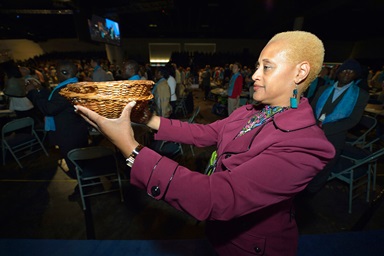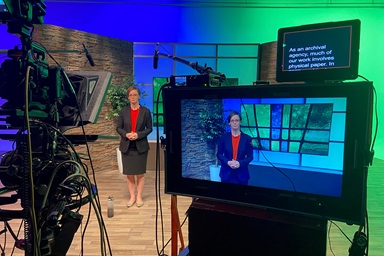An outpouring in end-of-year giving left United Methodist finances in better shape than projected in the early months of the pandemic.
However, between the ongoing COVID-19 menace and the possibility of a denominational split, The United Methodist Church still faces financial uncertainty.
Altogether, preliminary figures show that the denomination’s General Council on Finance and Administration collected about 79.3% of 2020 U.S. apportionments — requested shares of giving that support denomination-wide ministries.
That’s the denomination’s lowest collection rate in at least 15 years, but it’s significantly better than the 70% collection rate that GCFA staff were projecting in the fall.
Learn more about 2020 giving
The General Council on Finance and Administration reported that 18 annual conferences in the U.S. and eight episcopal areas in Africa, Europe and the Philippines paid 100% of general church apportionments.
Apportionments to the general church come from annual conferences, which in turn apportion giving from local churches. The U.S. supports the bulk of general church ministries.
Bishop Mike McKee, General Council on Finance and Administration board president, attributed the December surge in giving, in part, to churches feeling more stable about their own finances amid the pandemic’s challenges. McKee leads the North Texas Conference.
Faced with uncertainty about the denomination’s future, most denomination-wide ministries already had budgeted for a 70% to 75% collection rate in 2020 and are budgeting for around a 50% collection rate this year.
King presented the 2020 preliminary giving totals to the General Council on Finance and Administration board during a special online meeting Jan. 29.
The board met to review a presentation King plans to give at a 2 p.m. U.S. Eastern time Feb. 13 webinar that the Council of Bishops and jurisdictional leaders are organizing for U.S. General Conference and jurisdictional delegates. Non-delegates will able to watch the webinar on ResourceUMC.org.
The bishops have recommended that the delegates postpone elections of any new bishops until 2024 in order to stabilize the fund that supports bishops’ work. At present, 14 U.S. bishops plan to retire this year or have taken on new roles with the Council of Bishops.
It remains unclear what a postponement in U.S. bishop elections would mean for the number of bishops serving and how each jurisdiction handles episcopal oversight. Retired bishops can serve in interim roles.
Subscribe to our
e-newsletter
Like what you're reading and want to see more? Sign up for our free daily and weekly digests of important news and events in the life of The United Methodist Church.
“GCFA does not recommend any reductions or any other thing,” said the Rev. Moses Kumar, the agency’s top executive. “We are merely in the business of giving the facts.”
The facts are that The United Methodist Church has seen giving to general church ministries drop for two consecutive years.
Giving initially declined after the special 2019 General Conference, by a 438-384 vote, strengthened church bans on same-sex weddings and “self-avowed practicing” gay clergy.
Since then, a diverse group of denominational leaders has developed a proposal that the denomination split along theological lines, with United Methodists who support the current LGBTQ restrictions being able to leave with church property and $25 million in church funds to form their own denomination.
To take effect, the proposal needs the support of the General Conference, the denomination’s top lawmaking body.
However, the COVID-19 pandemic forced the postponement of last year’s General Conference, and the slow rollout of vaccines has put in doubt whether the denomination’s global legislative assembly can go forward as planned on Aug. 29-Sept. 7 in Minneapolis.
Uncertainty around General Conference also leaves up in the air when jurisdictions in the U.S. and central conferences in Africa, Europe and the Philippines can meet. Jurisdictions and central conferences are the bodies that elect bishops.
In the meantime, the economic fallout of the COVID-19 pandemic has only added to the denomination’s financial strain.
The preliminary figures for 2020 show that United Methodists around the globe gave about $115.5 million in general-church apportionments. That’s about an $8 million decline from 2019, a year that already saw a marked decrease from recent years.
General church apportionments support seven funds. Those funds include support for bishops, ministerial education, most general agencies, general administration, and denomination-wide efforts such as the Black College Fund, ecumenical work and Africa University in Zimbabwe.
But not all funds received the same level of support. Africa University, the second-smallest fund, saw an 88.4% collection rate while the General Administration, the fund that supports General Conference and GCFA itself, saw the lowest collection rate at 76%.
“That’s a pretty broad range — a 12% point swing between funds,” King said.
The Episcopal Fund that supports the bishops’ work received about 86.5% of requested apportionments in 2020. That marks the lowest collection rate on record for the fund.
The fund, in some ways, is in a more precarious position than other general-church funds and it has less flexibility in expenditures. Unlike agencies, which have already laid off staff, bishops serve set terms and most are elected for life.
In 2019, months before the first reports of COVID-19 cases, GCFA warned the Council of Bishops that without changes the Episcopal Fund would run out of reserves by 2024. Since May 2020, the bishops have been working on ways to make the fund sustainable.
The Council of Bishops executive committee hopes to use the coming webinar to help General Conference and jurisdictional delegates do their work. The bishops have allotted eight minutes for GCFA’s presentation.
Ultimately, General Conference determines the number of bishops elected and U.S. jurisdictions determine the conferences their bishops serve.
Hahn is a multimedia news reporter for UM News. Contact her at (615) 742-5470 or [email protected]. To read more United Methodist news, subscribe to the free Daily or Weekly Digests.
Like what you're reading? Support the ministry of UM News! Your support ensures the latest denominational news, dynamic stories and informative articles will continue to connect our global community. Make a tax-deductible donation at ResourceUMC.org/GiveUMCom.




